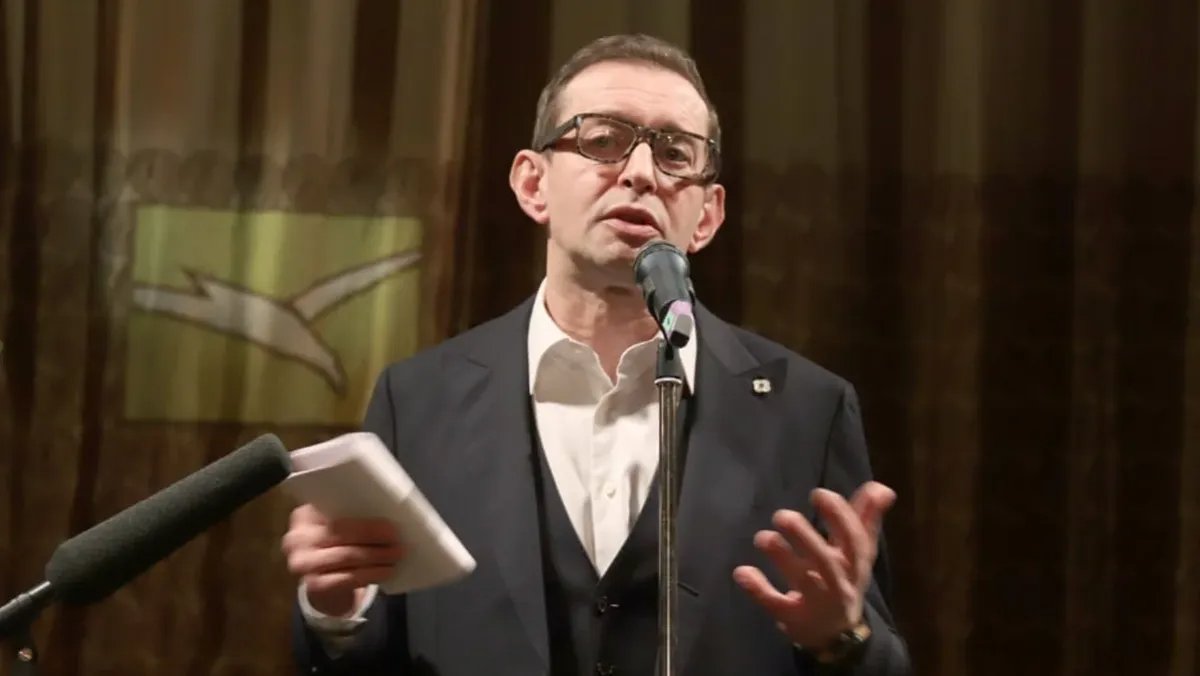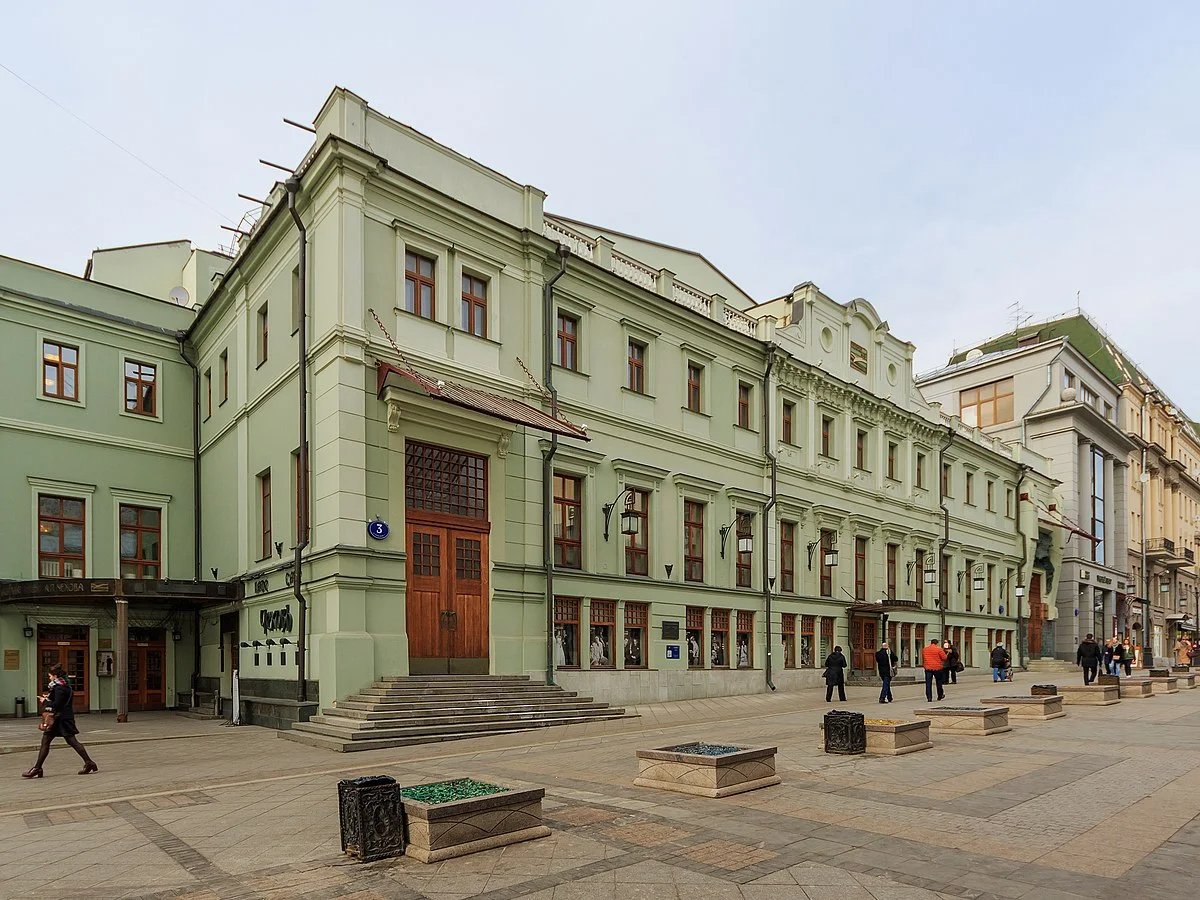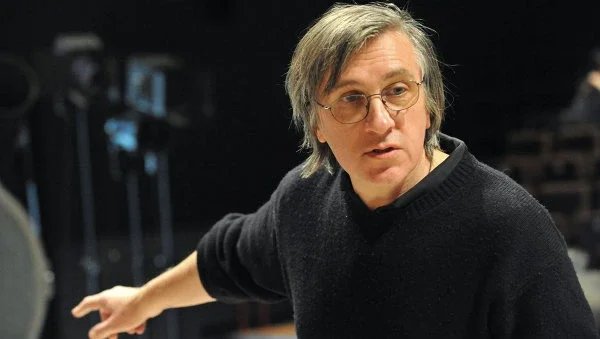With the start of the new theatrical season, more reports have been trickling in about cancelled plays or ousted directors who previously spoke out against the war. Plays by Dmitry Krymov and Aleksandr Molochnikov have been taken off the repertoire, while artistic director of the Moscow Art Theatre Konstantin Khabensky has decided to pull all plays that “crack jokes” or “make ironic remarks”.
Novaya Gazeta. Europe has gathered all the information about the latest wave of cancellations at Russian theatres.

Konstantin Khabensky. Photo: the Moscow Art Theatre
‘He probably likes running the theatre a lot’
On 2 September, the Moscow Art Theatre held a meeting between the theatre’s management and the artists. Russian Minister of Culture Olga Lyubimova greeted the troupe in a video address, and then the theatre’s artistic director Konstantin Khabensky took the stage. “A theatre is a living organism. We are not obligated to comment on events, but we must feel the situation, feel the audience’s state of mind, feel why they are coming to us,” he said. “Because of this, we had to abandon some of the plays announced in December–January of last season. I think it would be simply wrong and inhumane to take on new material for the Art Theatre that would somehow make ironic remarks, crack jokes, or have its own interpretation of the topics connected to some kind of military activity and the human tragedies related to it. There is enough of this in the media field already.”
Instead, Khabensky offered the team “to give the viewers an opportunity to look inside themselves” and “to calm down a little”. He added that some of the plays announced earlier for the current theatrical season would be postponed “due to inability to obtain copyright”. “What was previously solved in a couple of months is now spread out indefinitely… But it is just a question of patience and time. At the end of the day, they lose more than we do in this situation! :))) [sic]” Khabensky said, quoted on the Moscow Art Theatre’s official website.
Here are some of the plays cancelled this season according to Theatre magazine: Adam and Eve, a play by Mikhail Bulgakov that was to be staged by director Yury Butusov but was then handed over to Marina Brusnikina, and All About Eve, directed by Yevgeny Pisarev. Besides, during the meeting, there was no mention of cooperation with directors Roman Kocherzhevsky, Andrey Pershin and Yury Bykov. Plays by Timofey Kulyabin and Dmitry Krymov did not come up during the meeting either.
“Some of the Moscow Art Theatre’s plans have changed. I know that they were meant to put on [plays] directed by Krymov and Kulyabin, but they won’t be staging them, as those directors have simply left Russia,” theatre critic Anton Khitrov says. According to him, the Moscow Art Theatre has such a large repertoire that it is hard to say at this point what plays Khabensky meant when he talked about the unacceptable “ironic remarks”. “Honestly, I think no one really understands what Khabensky meant. He probably meant to say ‘don’t touch us, please’. But what decisions will follow this? I don’t know,” Khitrov points out.
After the meeting with the troupe, Khabensky told the media that so far, he has “no plans to pull any plays”. However, Theatre magazine noted that several plays, such as The Merchant of Venice by Ekaterina Polovtseva, Front-Line Stalingrad by Sergey Zhenovach, Sugar German by Ulanbek Bayaliev, and White Nights by Aydar Zabbarov, are no longer in the theatre’s repertoire. Director Kirill Serebrennikov, whose play The Pillow Man was also cancelled, spoke out against the war during the premiere of his new film in Cannes. “I am confident that the art and the artists can make it so the war would stop. Let us at least think that it will end someday and that we’ll live in a peaceful Europe. No to war,” he said, quoted by Meduza. Nevertheless, the reason for the cancellations is not officially known. The Moscow Art Theatre did not respond to Novaya Gazeta. Europe’s request for comment.

The Moscow Art Theatre. Photo: Wikimedia
Konstantin Khabensky succeeded director Sergey Zhenovach as head of the Moscow Art Theatre in October 2021.
“[Zhenovach] wasn’t from the Art Theatre, he wasn’t even from the Moscow Art Theatre School, he was from a different drama theatre. It was a rather odd, random appointment,” Khitrov said. “When Khabensky came, it seemed more organic: he worked alongside [Oleg] Tabakov (a prominent Soviet and Russian actor, artistic director of the Moscow Art Theatre from 2000 until his death in 2018 — translator’s note). And Khabensky demonstratively invited [Konstantin] Bogomolov, whom Zhenovach refused to work with.” Translator’s note: Konstantin Bogomolov is a Russian theatre director known for his manifesto in which he dubbed the West a “New Ethical Reich” and criticised “progressive” European values.
After the war in Ukraine began, Khabensky said on Instagram that he did not want to “discuss politics”. “Because theatre is the place that discusses humans, the life of the human spirit, the value of the human life,” the actor and director said, quoted by RBC.
“I think Konstantin Khabensky wouldn’t have lost much if he had quit and left. I don’t know what he’s thinking, what he supports. It seems that he enjoys running the theatre, or he thinks that he is saving people in this way, and if he leaves, the team will have to work with someone like Zakhar Prilepin (Russian writer known for his radical pro-war views — translator’s note). But still, this is a conformist stance, and I condemn it,” Anton Khitrov says. “But, to Khabensky’s credit, he did not pull [theatre director Dmitry] Krymov: his play Seryozha is still on at the Moscow Art Theatre.”
‘Red lines that an artist cannot cross are now right up against their feet’
In early September, it was reported that several Russian theatres had cancelled plays by Dmitry Krymov, who spoke out against the war in Ukraine and left Russia. The director told Dozhd TV channel that he had found out about the cancellation from people who called him to give their “commiserations and support”. Krymov refused to answer Novaya Gazeta. Europe’s question about the reasons for the cancellations, noting that this is not for him to say.
Theatre magazine reported that in the run-up to the new theatrical season, Moscow theatres had been advised to cancel all plays by Dmitry Krymov. By the time of the publication, the plays were taken off the repertoire of the Pushkin Theatre, the Pyotr Fomenko Workshop Theatre, the School of Modern Play, and the School of Drama Art. The School of Modern Play stopped ticket sales for all upcoming showings of Everyone is Here: actors involved in the play say that it has been “put on pause until February”. The School of Drama Art has pulled Krymov-directed plays Without a Dowry and O-y. Late Love. “It’s likely that this brilliant initiative [on cancelling plays by directors who spoke out against the war] comes from the Moscow Department of Culture,” Anton Khitrov suggests.

According to the theatre critic, in the first months of the war, the Moscow Department of Culture gave a similar directive: “no Vyrypaev, no Durnenkov”. Later, their plays were taken off the repertoire of Moscow theatres. In March, playwright and director Ivan Vyrypaev vowed that he would donate all the money he earned from his plays to Ukrainian charities. After this statement, his plays were pulled all across Russia. Another director, Mikhail Durnenkov, wished victory to Ukraine, after which he was fired from his teaching position at the Moscow Art Theatre School. Durnenkov’s plays at Russian theatres were cancelled too. The theatre community took his side: an open letter in his support was signed by over a hundred theatre figures.
Another director Aleksandr Molochnikov fell victim of the Moscow government’s “cancel culture” for signing an anti-war letter. His plays have already been taken off the Bolshoi Theatre’s repertoire. Molochnikov refused to comment on the situation. “The plays are taken off with the playwright’s agreement or without it, there is nothing new to it. This is a well-established practice, a reality that we live in,” Anton Khitrov said. “Perhaps, so many reports are coming in now because it’s the start of the theatrical season: clearly, they decided to deal with other issues in the summer.”
“Honestly, all these big government institutions produce content that is so meaningless right now. The only thing that matters today are anti-war plays that they can’t put on,” the critic says. “I haven’t written any texts about the theatre since February. Well, actually, I did write one, when they shut down the Gogol Centre, because everything just seems so void of meaning to me now. The red lines that an artist can’t cross are now right up against their feet. You can’t go anywhere. An imitation of regular life — this is what they want from the artists. You don’t have to put on a show of loyalty and patriotism, you can just do your thing. The most important thing is to imitate the life we had before. To show that everything is as it was, that nothing’s changed.”
Делайте «Новую» вместе с нами!
В России введена военная цензура. Независимая журналистика под запретом. В этих условиях делать расследования из России и о России становится не просто сложнее, но и опаснее. Но мы продолжаем работу, потому что знаем, что наши читатели остаются свободными людьми. «Новая газета Европа» отчитывается только перед вами и зависит только от вас. Помогите нам оставаться антидотом от диктатуры — поддержите нас деньгами.
Нажимая кнопку «Поддержать», вы соглашаетесь с правилами обработки персональных данных.
Если вы захотите отписаться от регулярного пожертвования, напишите нам на почту: [email protected]
Если вы находитесь в России или имеете российское гражданство и собираетесь посещать страну, законы запрещают вам делать пожертвования «Новой-Европа».
